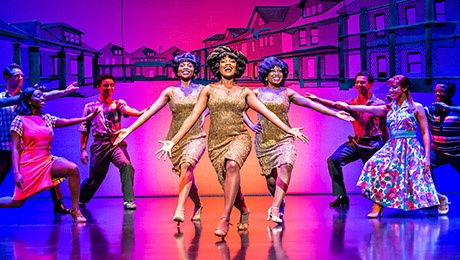
Berry Gordy’s status as one of the greatest figures in the music industry is secure. His Motown record company produced an astonishing number of hit songs that appealed both to the black community and to white pop music fans, and during the 1960s Motown was by far the most successful African-American business. His stable of singers delivered a highly polished and carefully choreographed version of soul, as exemplified by My Girl by The Temptations, or You Can’t Hurry Love from The Supremes. It is therefore no wonder that the story of Motown Records has been turned into Motown The Musical, co-produced by Gordon Berry himself, and based upon his book To Be Loved: The Music, The Magic, The Memories Of Motown.
Not surprisingly, this is a show where Motown music itself takes centre-stage. The songs are presented with great energy and panache, with shiny suits and dazzling dresses in abundance. All the performance routines are slickly delivered and the singing is often glorious, all supported by Griff Johnson’s funky ten-piece band. What’s not to like?
There were many in last night’s audience who were clearly having a great time from the get-go, yet I was left feeling somewhat underwhelmed. The very best musicals have a strong narrative core, and the songs are relevant to the actions and emotions of the characters. These qualities are distinctly lacking here. There are so many songs crammed into the show, at least fifty of them, that there is very little room left for narrative. Even the songs themselves are usually presented in a severely shortened form, seldom lasting for more than a minute or so. It would have been good to have been able to hear the greatest of them in their entirety. It’s surely a crime to prune Marvin Gaye’s Grapevine.
We first see Berry Gordy rather sulkily refusing to attend a twenty-fifth anniversary celebration of Motown. He is resentful that many of his artists had abandoned Motown and moved to rival companies, and he begins to look back on his life. We learn that in his earlier years he was less than successful as a boxer, that he had been a car-worker and salesman, and that his first forays into the music business were as a songwriter, creating Reet Petite for Jackie Wilson. His story is fascinating, but in Motown The Musical it is delivered in such a quick-fire, fragmented and lightly sketched form that there is little or no emotional impact. Each segment of his personal history seldom lasts for a minute or more, and along comes yet another energetically-delivered song; the audience duly applauds the performance, and any sense of narrative flow is lost.
Ironically, though this is very much Berry Gordy’s story, his character is largely unexplored. It is entirely appropriate that the focus of this show should be on the songs that his company produced, but it would have been interesting to learn more about the man who drove Motown to such success. Berry Gordy was married three times and had eight children, one of them with Diana Ross, so his private life must have been quite turbulent, but we learn little of this. The show touches on the idea that he might have been too much of a control freak, and that he did not give his singers sufficient creative freedom., and there is also a hint that his real focus was on making money rather than upon artistic integrity. One of the best scenes in the show occurs just before the interval, when he is pressurised into allowing records to be made that reflect the political realities of the times, such as Marvin Gaye’s What’s Going On? But generally, the social and political background to the story of Motown is skated over. Even the issue of segregated audiences in the Deep South is treated rather lightly. Berry Gordy has every right to tell his own extraordinary story, but I wonder if he was too close to the wood to see the trees. A more detached and objective observer might have produced a more nuanced and thoughtful tale.
However, there is no doubt that Motown The Musical is blessed with five-star performances in the leading roles. Shak Gabbidon-Williams is an entirely convincing Marvin Gaye, and Nathan Lewis brings both humour and pathos to his portrayal of the great Smokey Robinson, Motown’s chief songwriter and producer. Karis Anderson is very engaging as Diana Ross, showing her transition from youthful, flirtatious minx into full-blown superstar; her scenes with Ross’s employer/lover Berry Gordy give a tantalising glimpse of what this show might have been. Edward Baruwa gives his all as Gordy, and when the Motown empire begins to crumble, he has his finest moment, delivering the moving song Can I Close The Door On Love? with real power.
Despite my reservations, I can see why Motown The Musical is a hugely successful show that has triumphed on Broadway and in the West End. Sixty years on, Motown’s music deserves to be remembered and celebrated, and for those who love juke-box musicals this show is an absolute must-see. ★★★☆☆ Mike Whitton 12th January 2019

